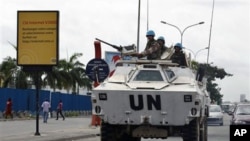Journalists in Ivory Coast are facing attacks from supporters on both sides of Ivory Coast's presidential crisis, the Committee to Protect Journalists says.
Three months after a presidential election devolved into a violent power struggle for control over West Africa's second largest economy, Ivory Coast has become a dangerous land for reporters, says the Committee to Protect Journalists.
The watchdog group's new report documents attacks against journalists that it says have been committed by both sides in a conflict that many are now are calling a civil war.
The U.N. says more than 460 have died since the post-election crisis began in December. Africa Advocacy Coordinator Mohamed Keita says that reporters, who are known for the political stances they take are at greater risk than most.
"Local journalists are the victims of attacks, threats, intimidation, kidnapping attempts and their security conditions are deterioration. Some are even completely stranded in their homes, afraid to go out because of armed gunmen," he said.
The nation remains split along north-south lines, with northern-based rebels backing Alassane Ouattara, who is recognized by the United Nations as the winner of last's November's vote.
That vote was meant to heal the nation's persistent divide. But, incumbent president Laurent Gbagbo rejected the U.N.-certified results, alleging widespread voter fraud in the north.
Since then, the partisanship of the press, as well as the treats levied against them, have escalated, Keita says.
No actual journalist has been confirmed as killed, he said, although two non-reporting employees for a media house were killed for their perceived support of Mr. Gbagbo. A driver for a pro-Ouattara newspaper is feared dead, after he was kidnapped by Gbagbo supporters in February, Keita adds.
The report contains more incidents of violence committed by Gbagbo supporters. But he said that does not mean that Outtara supporters haven't committed crimes in northern areas that are harder to reach and study.
Keita also notes that the Gbagbo government, which controls Abidjan, has allowed Ouattara newspapers to continue printing, while rebels in the north control the media landscape enitrely, he said.
"Generally, the media is first in line to suffer during a crisis. As soon as this crisis began, the Gbagbo government, one of their first actions was to suspend all the international news channels, French channels, that were broadcasting into Ivory Coast. This has been a battle for control for the country and the national institutions, and this battle has been waged through the media. It has been a war of words," Keita said.
Mr. Gbagbo has recently attacked the international media, accusing them of false reporting, warning them to not aid "terrorists" in the country.
Rights Group: Ivory Coast Journalists At Risk
- By Drew Hinshaw









